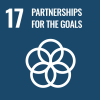Mexicali, 15 September 2023 – When Josué and Yesenia left Central America in 2018 seeking a better life in the United States, they never imagined they would find love and an unexpected new home in northern Mexico.
Josué, from Honduras, and Yesenia, from El Salvador, met in Celaya, Guanajuato, in central Mexico. Their paths crossed after joining one of the groups of mostly Central American migrants aiming to reach the US-Mexico border.
"At the Celaya shelter, I was in charge of cooking. That’s how we met. From there, we started talking, he asked me out and I said ‘Yes,’” says Yesenia.

Josué and Yesenia found an unexpected home and new opportunities in Mexicali, in the state of Baja California in Northwestern Mexico. Photo: IOM/Sara Salazar
Five years after that chance meeting, the couple decided to tie the knot with the assistance of the Consular Fair in Mexicali, an initiative by the International Organization for Migration (IOM) to help migrants with their legal paperwork.
Like millions of people around the world, Josué and Yesenia faced serious challenges related to legal identity – they didn’t carry proper ID documentation when they embarked on their journey.
It is estimated that nearly 1 billion people worldwide do not have any type of identity document. Out of these, 34 million were in Latin America and the Caribbean in 2018, and 3.7 million in Mexico, according to the IOM's Overview of Legal Identity in the Americas.
Lack of documents often means people are excluded from basic services and rights, including legal procedures such as marriage.

The newly wed couple is building a support network in their new home. They have good Mexican friends and neighbours and are protected by social security. Photo: IOM/Sara Salazar
The path they followed with thousands of others was long and exhausting, but they always found support from kind-hearted individuals along the way. It took them two months to arrive in Mexicali after leaving Celaya, and the city opened new perspectives in their journey.
Back home, Yesenia worked at a company producing cell phone cases while Josué worked in construction, but the low pay barely covered their basic needs.
“Our goal was to go to the other side (to the US), but we saw that here there are also many job opportunities. We want to overcome adversity and help our families back home so they can do the same,” says Yesenia.
The lack of legal documents hindered their decision to wed in Mexico – they were only carrying photos of IDs which were rejected by various institutions.

Josué and Yesenia met at a shelter in Celaya, central Mexico, when they were on their way to try and reach the US-Mexico border. Photo: IOM/Sara Salazar
"We were asked for our original papers from our home countries. They were e-mailed to us, so they weren't considered valid. We inquired at several civil registries, but none accepted them," Josué says.
Unable to prove their legal identity and resigned to not getting married in Mexico, Yesenia and Josué then learned about IOM and the Free Legal Clinic at the Autonomous University of Baja California (UABC) Law School. Together, they facilitated the couple's dream.
Their unique wedding venue was the Law School, an IOM partner in the Consular Fair, in collaboration with Mexican government authorities and the consulates of Honduras and Guatemala.
"To help Yesenia and Josué, IOM collaborated with UABC's Free Legal Clinic, and the Municipal Civil Registry," says Irvin Guerrero, Protection Assistant at IOM in Mexicali. “We provided support to help them compile their paperwork, review it, expedite the process, and even waive the fees. Today, they’re officially married.”

IOM assisted Josué and Yesenia in getting married, providing legal and consular support, in alliance with partners. Photo: IOM/Sara Salazar
The civil ceremony took place in the law school auditorium, decorated with rose petals and flowers by students and faculty. They were accompanied by their Mexican neighbours and friends, Charlie and Patricia, who served as witnesses.
"Ever since we arrived and settled here, they have supported us," says Yesenia. "Charlie says we're like his children. He always encouraged us, saying we could succeed here even if we were from another country. He's a great neighbour."
Now, Josué has a formal job in Mexicali, collecting waste for private communities, a job that provides him with social security. Now married, he can also include Yesenia as a beneficiary, ensuring both are protected.

On their wedding day, the couple requested to take a picture with the team that made their marriage possible: IOM staff, the Baja California Autonomous University Law Faculty team and local Civil Registry officials. Photo: IOM/Sara Salazar
When asked about their future, Josué said: "We'd like our own home; maybe start a small business. If God blesses us with four kids, that'd be enough," he jokes as Yesenia laughs.
"Helping Yesenia and Josué has been incredibly rewarding," says Guerrero. "What might seem simple for some can be challenging for others. Being part of this reminds me of the positive impact of our daily work for migrants."
After our conversation, the newlyweds asked Guerrero to join them for a photo, a memorable end to an unforgettable day for the couple and for IOM Mexicali.
Story and photos by Sara Salazar, IOM Mexico.



